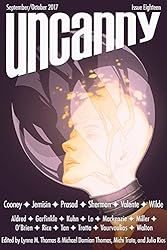
![]() “Flow” Marissa Lingen (March 2018, free at Fireside Fiction)
“Flow” Marissa Lingen (March 2018, free at Fireside Fiction)
In Marissa Lingen’s “Flow,” teenaged Gigi, who loves her father and proudly shares his mannerisms, accidentally discovers — or is discovered by — naiads in the nearby woods. The naiads knew her father, and are pleased to meet Gigi, who spends time over the coming years performing small tasks for the naiads and coming to know more about their environment. But two tragic and life-changing events befall Gigi, who must reshape her self-image and how she fits into a world that doesn’t make accommodations for either water nymphs or people with assistive devices.
“Flow … means how we walk. And I have always walked like my father.”
Filled with deeply personal details and insightful prose, “Flow” is a story about loss, grief, and magic, and how our lives are changed irrevocably by them. It’s about being like water, to paraphrase Bruce Lee; about adapting one’s self to fit one’s surrounding circumstances and finding ways to thrive and find happiness despite obstacles. “Flow” is also, crucially, about parental love and support, and the shifts in perspective gained by maturity. And, sneaking in beneath the substantial emotional journey, there’s a message of conservationism and a respect for science, which are to be expected in any Lingen story. Highly recommended. ~Jana Nyman
![]() “Fandom for Robots” by Vina Jie-Min Prasad (2017, free at Uncanny, $3.99 Kindle magazine issue)
“Fandom for Robots” by Vina Jie-Min Prasad (2017, free at Uncanny, $3.99 Kindle magazine issue)
Computron, despite being the “only known sentient robot,” is dismissed by society as a quaint artifact, because it was built in 1954 and boasts a boxy steel frame and claw design. It’s now part of the Simak Robotics Museum, and its only function is to play a role in the museum’s Robotics Then and Now presentation for visitors, representing the “Then” portion of the program and answering four questions to demonstrate its sentience (a breakdancing android represents the “Now” segment).
Everything changes for Computron when a teenage girl asks it if it has ever watched the anime program Hyperdimension Warp Record; Computron reminds her of one of the characters. Instead of entering sleep mode afterwards, Computron determines that it is logical to spend some time researching this anime series on the internet, in order to better answer any future questions on the topic.
Between watching the series, viewing the online bulletin boards, and perusing the extensively footnoted fan encyclopedia, Computron does not enter sleep mode for ten hours, thirty-six minutes, two seconds, and twenty milliseconds.
So web surfing can be a timesuck for robots too ― good to know! Not only does Computron become a fan of the series, it decides that ― other fans’ depictions of the robot character Cyro being inadequate ― it should take a shot at writing fanfiction itself. Computron’s first HyperWarp fanfic story is met with a fair amount of confusion by other fans … but one enthusiastic fan, bjornruffian, sees potential in its writing, and they begin communicating online.
“Fandom for Robots” is both charming and insightful in relating how an intelligent robot finds a way to develop into something more, even if the path it chooses seems an odd choice. We are assured that Computron can feel no emotion, and yet there is something of that nature bubbling beneath Computron’s logical surface. The fanfic community and online discussions are depicted with humorous affection, and there’s a poignancy to Computron’s eagerness to being a productive member of its newfound community that has stuck with me. ~Tadiana Jones
![]() “Clearly Lettered in a Mostly Steady Hand” by Fran Wilde (2017, free at Uncanny, $3.99 Kindle magazine issue)
“Clearly Lettered in a Mostly Steady Hand” by Fran Wilde (2017, free at Uncanny, $3.99 Kindle magazine issue)
The September/October 2017 issue of Uncanny magazine yielded two worthy Nebula nominees. In “Clearly Lettered in a Mostly Steady Hand,” a visitor is carefully ushered through a Victorian type of freak museum by a guide, who narrates this short work. From the moment you pay your dime and enter, the evocative, disturbing imagery builds, as you and the insidious guide make your way from room (A Hallway of Things People Have Swallowed) to room (A Room of Objects That Are Very Sharp, and more).
Maybe take this chair. I’ll push you around. The wheels squeak on the wood floor, and the chair is really more of a bin. Don’t mind the parts in there with you, the arms bent at angles, some screws missing; the legs, still braced, the leather straps, the metal bits and the plastic… remember, plastic’s newer and we don’t really respect anyone who’s turned on by that. Comfy?
I wish you could see yourself. Slouching! You’re becoming a mess. Mouth wide open. And that stare. At the glass cases, at me. Surely you’ve seen us before, on the street? In a shop?
“Clearly Lettered in a Mostly Steady Hand” isn’t as accessible as “Fandom for Robots,” and it certainly won’t leave you with cozy feelings. But it is weirdly intriguing, and demanded a second read from me. Its second person narration pulls us readers into the story, as we play the role of a visitor who has judged those who are different and unusual … and may end up paying a horrible price for it.
Stay quiet, it will be over soon—
~Tadiana Jones





Agree! And a perfect ending, too.
I may be embarrassing myself by repeating something I already posted here, but Thomas Pynchon has a new novel scheduled…
[…] Tales (Fantasy Literature): John Martin Leahy was born in Washington State in 1886 and, during his five-year career as…
so you're saying I should read it? :)
As a native New Yorker, I love the idea of the city being filled with canals and no skyscrapers! And…